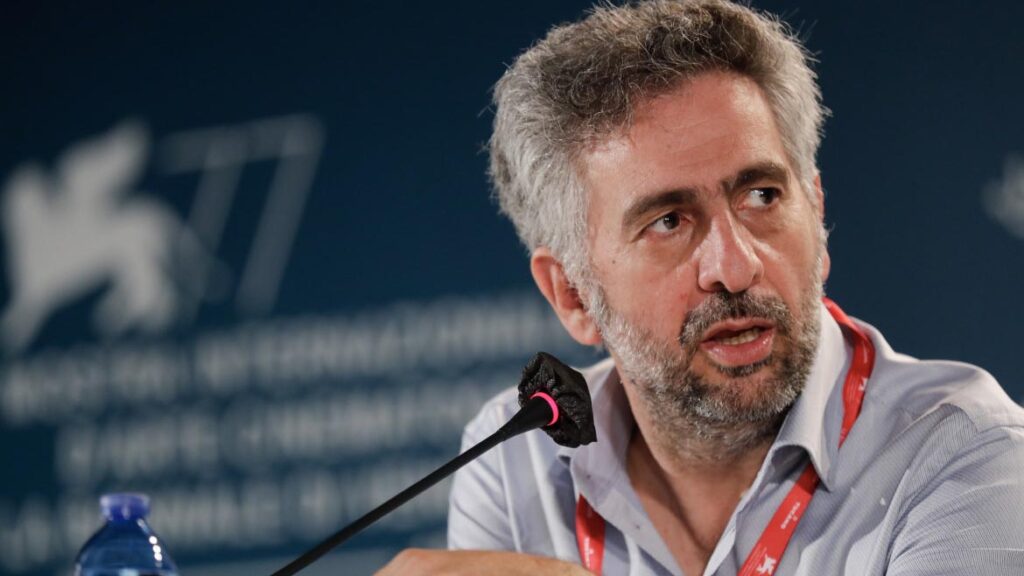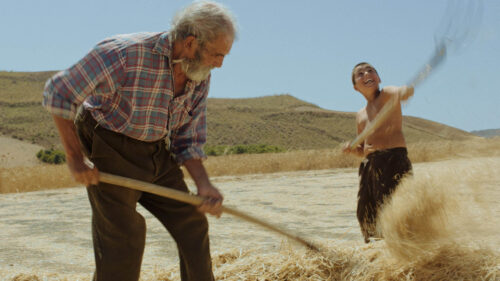
Director Salvatore Mereu presents Bentu, his sixth feature film, at Venice Days. Once again, his rugged, ancestral homeland of Sardinia is the protagonist, together with an old farmer and a boy.
These lives flow at a rhythm that is totally different from what we are used to. Your film speaks of a time that is apparently far away, but it’s not that long ago, really.
Speed is a modern concept. In rural farming communities, it is a somewhat foreign concept. When I read Antonio Cossu’s short story, the one that inspired Bentu, what interested me the most is the inevitable relationship that this old man has with nature and with its rules, which cannot be circumvented or ignored. It is he who is waiting for wind to allow him to thresh his harvest, which was common to do manually before the advent of mechanized agriculture. Sometimes, the wind throws a tantrum and refuses to blow, which forces farmers to spend a longer time in the fields. We cannot control nature. Cossu’s story is amazing in its depiction of suspended time, the challenge of man and nature, and the momentous arrival of modernity with an archaic society resisting it. We are nature’s guests, and slowness is not an absolute value in itself, but within the old man’s community, it is the right way to relate to their environment. I tried to represent this dimension, knowing full well that our habit as moviegoers is to watch a movie severely judging what happens in the first fifteen minutes just doesn’t work here. This is not the right film. The key to understand this movie is to think of looking around an old attic. This is a story on time and the ability to live it calmly, a story on the relationship between two people, and a story on patience, something that we forgot due to the way we lead our lives today.
Being Sardinian
It is a world that belongs to my education, to the place I come from. I am an islander and I come from a society that has long been isolated before suddenly finding a place of primary importance as a tourist destination. Sardinia being a timeless place often engenders conflict with the way it is lived today, and we feel this contradiction every time the tourist season begins. This is not because we live outside time or anything, but because for us, our bond with our homeland is essential and stronger than in most other places. This doesn’t mean we reject modernity, it just means we will never forget where we came from. It is more than folklore, it is about knowing where you stand, where you come from, and where to live respectfully your origins. It also helps that the sea had always been our ‘city wall’. In no way do I denounce progress and future, though. Now back to the film, the story is set in the mid-twentieth century, on the verge of modernity arriving in Sardinia.

Inspired by Antonio Cossu’s short story collection Il vento e altri racconti (‘The Wind and other stories’), “Bentu” (Sardinian for ‘wind’) is the story of intergenerational exchange, of man challenging nature, and – writes Mereu in th...
Your cooperation with the University of Cagliari
I have been working with the University for years. I alternate my work as a filmmaker with education. I hold film direction and screenwriting classes aimed at humanities majors – our goal is to get them to know the world of images and storytelling in film. Films are the result of a journey we have been on for years, and this is our third time in Venice in this capacity. Bentu is the most important result we ever had because students were involved, with tools that are proper of educational activity. We also had the support of local institutions, such as the Sardegna Film Commission and the Regional Ethnographic Institute, which have an important job in the history and study of traditions. There was no better film to put into fruitful practice this cooperation.
The tenth year of the Sardegna Film Commission
I am somewhat of a witness of this growth, because the Sardegna Film Commission debuted in Venice in 2012 with a film of mine, Bellas Mariposas, Before that, all Sardinia had was an information office that gave directions on filming locations. In ten years, the Commission grew so much, and today, it is an institutions that strongly supports real projects, especially coming from outside the island! I cannot deny that the work that has been carried out over the last ten years is huge, and thanks to the Film Commission, we were able to vanquish isolation. Our homeland is our essential background, not an accessory. There’s always a story of real people behind what we do, a story of people who lived their homeland fully, and I believe it shows in what Sardinian filmmakers do.
No results found.